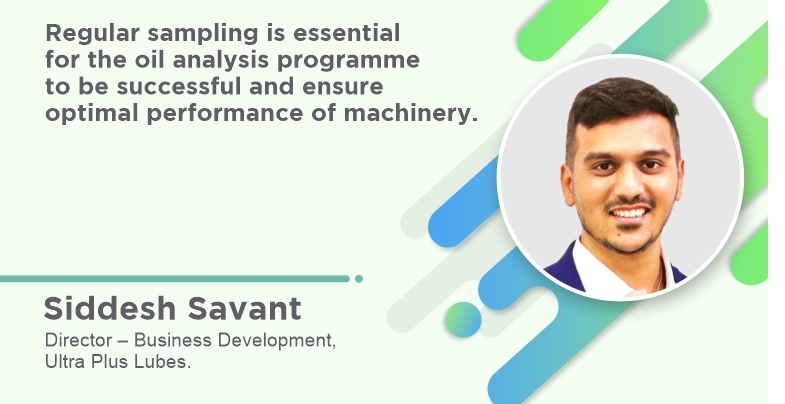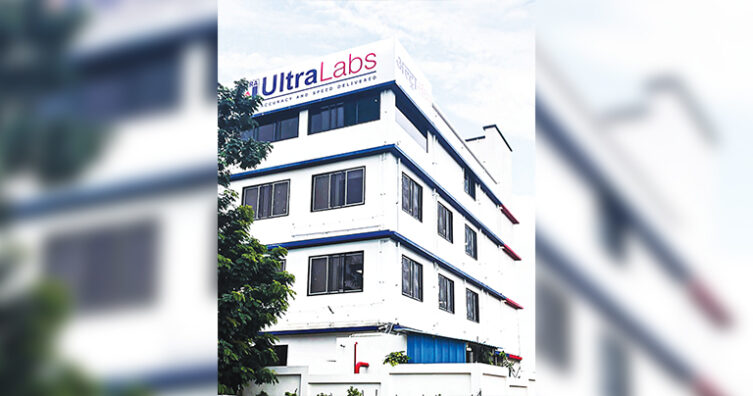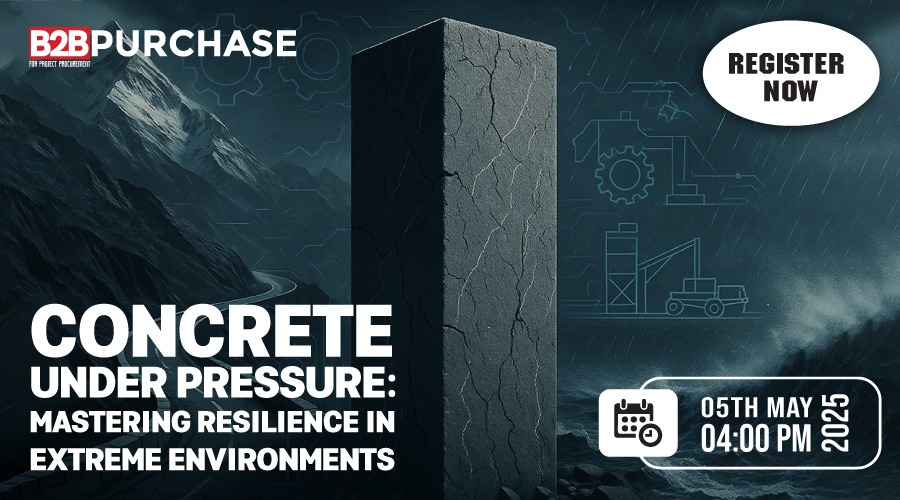The hidden power of lubricant analysis
By Edit Team | October 30, 2023 4:57 pm SHARE

Regular sampling is essential for the oil analysis programme to be successful and ensure optimal performance of machinery.
Can you provide an overview of your lubricant analysis company and its unique value proposition in the industry?
Ultra Labs has been in oil condition monitoring services for over five years. Our services are like a Pathology lab but for machines where you can predict the failures before they happen. There were many labs already during the period we started, but we wanted to make a difference. We focussed on the customer-facing issue and tried to solve his problem. Ultimately, the customer wants to understand the problem before any major failure happens. Hence, we worked on every aspect, from sample pick-up to report interpretation.
What inspired you to start a company specialising in lubricant analysis?
Our Parent company, Ultra Plus Lubes Ltd, was into lubricant blending, which was started in 1993, catering to various MNCs to meet their blending requirements. As an additional service to its existing customer base, we created a commercial laboratory in 2015 for testing used oil, fuel, coolant, and AdBlue. Thus started the journey of lubricant analysis, which has grown multifold in volume in the last nine years of operation.
How does your company’s lubricant analysis process work, and what are the key benefits it offers to clients?
Our main role often starts once the sample report is submitted to the customer. We have a very senior, technically capable team from across the industry. Moreover, our customer-driven analysis reporting tools and solutions-oriented data analysis take those quality results further, bridging the gap between good data and good business decisions.
Taking decisive maintenance action that reduces or eliminates failure saves money and equipment and further improves equipment reliability and uptime.
Could you explain the importance of lubricant analysis in ensuring optimal performance and longevity of machinery?
Regular sampling is essential for the oil analysis programme to succeed and ensure optimal machinery performance. Oil sample testing periodically helps in Oil Trend analysis and further assesses the internal condition of the engine/subassemblies. Oil analysis assists in understanding the oil properties and any wear and tear in the equipment; this helps identify any minor problem before it becomes major, thus improving the machine’s reliability and extending its longevity.
What are some common challenges industries face in managing their lubrication systems, and how does your company help overcome them?
Contaminants in lubricants are one of the major problems while handling lubricants. Most lubricant-related problems are due to contamination. Through oil analysis, we can detect if there is any contaminant when the problem has just started.
Are any specific industries or sectors most benefit from lubricant analysis? How does your company cater to their needs?
The mining and construction equipment manufacturers can benefit greatly because of their dedicated approach to used oil testing periodically.
Intervals, in turn, help them to reduce equipment breakdown through preventive and proactive maintenance, thus increasing the equipment uptime and meeting the commitment. Availability for equipment, thus saving the potential penalty, which is quite huge and the breakdown cost.
A small expense on oil testing goes a big way in extending the life of the engine / sub-assembly as well as from any potential failure due to operational or maintenance lapses.
Our internal study has indicated that the lubricant analysis cost is very meagre. However, the savings or ROI is almost 6/7 times the analysis’s annual spending cost lubricant. Ultra Labs further extends help in identifying any maintenance lapses or operational issues due to the use of impure or contaminated fuel in the engine operation.
We also extend our support in identifying any operational issues like using the wrong grade of oil, intermixing of different oil grades, overloading of the equipment, and operation of equipment at very high temperatures, which all can be identified through lubricant analysis.
What technological advancements or innovations have you incorporated into your lubricant analysis services to stay ahead of the competition?
We focus on root cause analysis: “Any subassembly is our core capability and thrust area; added to that, we have also started detailed filter analysis, which will be our primary focus areas in the future.”
Apart from the above, we are also working with many of the global mining OEMs operating in India on a long-term basis and are supporting them in data integration through our software merging, which further helps in faster results and data analysis, which is a key for success in today’s information world. In the future, we also have very ambitious plans for introducing AI-based technology to share the sample reports faster.
How do you ensure the accuracy and reliability of the lubricant analysis results provided to clients?
Ultra Labs is a NABL (ISO 17025) accredited laboratory. It is the only independent Indian laboratory in the country that participates in the International ASTM round-robin program for oil, fuel, coolant & DEF to ensure accuracy for our customers. We have always been rated within the Z score, an accuracy earmark.
Can you share any success stories or case studies where your lubricant analysis services significantly impacted a client’s operations or cost savings?
We carry out internal case studies and share our findings with our valuable customers on a quarterly dashboard presentation; this indicates the savings achieved. Based on the sample reports provided by the field engineers, the proactive remedial actions taken give immense pleasure to our technical team, Whose performance I measured by the number of equipment saved during a period.
While we cannot share any specific instance or company name due to the non-disclosure agreement entered with all our reputed clients, based on the equipment case studies of individual mining OEMs and shared by us to the various OEMs, it does indicate a huge saving to the customer in terms of proactive repairs.
What does the future hold for lubricant analysis? Are there any emerging trends or developments that could shape the industry?
Over the years, customer demands have been changing very rapidly. Today, our customers do not want to wait even a day for the oil testing reports and are looking for solutions. Remote monitoring devices are available in the market that can trigger any abnormality in the oil parameters through the sensors fitted on the engine/equipment. In the future, we feel that customers will rely on hybrid technologies viz sensor-based and on-site laboratories to ensure faster and more accurate results.

How does your company approach customer support and ongoing collaboration with clients to maximise the value they receive from your services?
Apart from the regular periodic interactions by our sales/marketing teams, we also have a technical team that regularly works with the field service engineers. We believe in enhancing the customer knowledge base in oil analysis; hence, we conduct online and on-site training sessions regularly, which helps better collaboration.
Apart from the above, we release daily technical tips under our ‘Ultra Daily’ programme, an information tip on oil and various technical subjects; this boosts the collaboration and has been widely appreciated. Today, we have a membership of over 700 engineers and managers from the construction and mining machinery who are a part of this WhatsApp group.
Due to the technical capability available in-house, we can provide a lot of value-added support in assessing the condition of the engine/various subassemblies through constant monitoring by our technical team. We also regularly provide advice to the OEM Service Engineers on the preventive actions to be taken to avoid any major failure. We have assisted many OEM clients in setting new wear limits for various equipment based on Indian conditions.
We assist our customers in RCA (Root Cause analysis) and CAPA (Corrective Action Preventive Action) through thorough analysis. We also go one step ahead in helping simulation trials for any fluid-related issues.
Could you discuss any sustainability initiatives your company has undertaken?
On the sustainability initiatives, a lot of work is being done under the programme ODI (Oil Drain Interval) in terms of mutually collaborating with the key OEMs and customers to increase the Oil drain period in Engines as well various other subassemblies based on systematically following all the laid down procedures and ensure optimum use of the Oil without compromising on the life of the Engine/subassembly. This will help reduce the oil requirement over the life cycle of the equipment.
What are your long-term goals and visions for the company, and how do you plan to achieve them?
Our Objective is to maintain a Customer Satisfaction level with Zero Customer Complaints and, the shortest Turn Around Time for result sharing. These are all achieved through our documented Quality Policy of consistently providing Quality testing services that conform to the customer and within the Stipulated regulatory framework. To continually improve the quality management systems, leading to the satisfaction of the customers, by ensuring integrity, maintaining confidentiality, and impartiality of testing services.
How has your emphasis on rapid turnaround time (TAT) and comprehensive technical support contributed to enhanced customer satisfaction?
Our Key to success has been the USP of delivering the sample results in the shortest possible time, i.e., TAT (Turnaround Time), a measurement for every customer. Apart from the above, we walk with the customer to resolve his problem through our active technical support and the close involvement of our technical team. Apart from this, we assist our customers in root cause analysis. We also help identify the root cause of the component failure, compare the existing metallurgy, and recommend suitable metallurgy changes to overcome the issue by testing the components at our lab. We also provide recommendations on the design aspect for increasing the component’s life, which is a leverage to any customer.
Cookie Consent
We use cookies to personalize your experience. By continuing to visit this website you agree to our Terms & Conditions, Privacy Policy and Cookie Policy.




































-20240213125207.png)

























